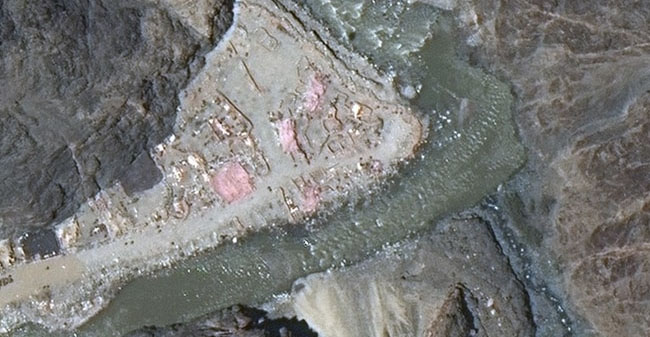Chinese Troops Seen Withdrawing From Himalayan Flashpoint; Modi Rallies Indian Troops
New Delhi (AFP) July 6, 2020
Chinese troops have started removing tents and other structures from a contested Himalayan valley where they fought a deadly battle with Indian soldiers last month, Indian army sources said Monday.
Twenty Indian soldiers were killed in brutal hand-to-hand fighting on June 15 in the Galwan Valley in Ladakh, sending tensions soaring between the nuclear-armed neighbours. China has acknowledged it suffered casualties but not given figures.
The two sides have since held military and diplomatic talks and said they want a negotiated settlement.
China’s People’s Liberation Army soldiers were “seen removing tents and structures” and there was a “rearward movement” of military vehicles in the Galwan Valley, the Indian army source told AFP.
“Disengagement with the PLA has started as per agreed terms in the Corps Commanders’ meeting,” the source added.
The source said the Indian army was “verifying” how far back Chinese forces had withdrawn.
There was no comment on whether there was a similar withdrawal by Indian troops.
Chinese foreign ministry spokesman Zhao Lijian told reporters in Beijing on Monday that both sides had made “positive progress… to disengage frontline troops and ease the border situation”.
“We hope that the Indian side will go with the Chinese side to implement the consensus reached by both sides with practical actions,” Zhao added.
The Galwan Valley incident was the first time in 45 years that soldiers had died in combat on the Asian giants’ long-disputed border.
India and China fought a war over the frontier in 1962.
Anti-China sentiment has been growing in India since the high-altitude clash, with the government banning Chinese mobile apps including the wildy popular TikTok.
Modi Rallies Indian Troops After China Border Clash
Srinagar, India (AFP) July 3, 2020 – Prime Minister Narendra Modi made a surprise visit to rally Indian troops near a disputed frontier with China Friday, telling them the country’s enemies had seen their “fire and fury” following a deadly border clash last month.
The incident in the Galwan Valley in Ladakh saw 20 Indian troops killed in brutal hand-to-hand fighting and was the first time in 45 years that soldiers died in combat on the Asian giants’ long-disputed Himalayan border.
China has admitted it also suffered casualties but has refused to divulge how many.
Accompanied by the head of India’s military and the army chief, Modi visited an army camp about 100 kilometres (60 miles) as the crow flies from the site of the battle before meeting injured soldiers in a military hospital.
“In these difficult circumstances, you are the shield of the motherland,” said Modi, sporting a khaki green parker jacket, aviator sunglasses and baseball cap of the “Fire and Fury” corps stationed there. “The enemies of Mother India have seen your fire and fury.”
Without naming China, Modi added that the “era of expansionism is over… History has shown how expansionism pushed humanity towards destruction.”
“India has always pursued the path of peace in the world but at the same time, those who are weak can never initiate steps for peace. Bravery and courage is a prerequisite for peace,” he added.
Mutual Blame
China and India have long had a prickly relationship.
Both sides have blamed each other for the clash and since sent thousands of extra troops to the region.
They have held several rounds of military-level talks and said they want a negotiated settlement but have made little apparent progress.
Amid outrage on social media, India has attempted to turn the screws on China economically, this week banning 59 Chinese mobile phone apps including the wildly popular TikTok citing national security concerns.
Chinese imports including raw materials vital to India’s huge pharmaceutical industry have reportedly been piling up at Indian ports due to more stringent border checks.
Ministers said this week that India will no longer buy Chinese equipment for power stations and that Chinese construction firms will be barred from new road projects.
Chinese foreign ministry spokesman Zhao Lijian at a regular briefing on Friday hit out at “irresponsible remarks” by Indian politicians and called for cooperation.
“Frictions between both sides is the wrong way to go, and goes against the fundamental wishes of the people on both sides,” Zhao said.
“India should not make a strategic misjudgement on China.”
Courtesy: Space War

